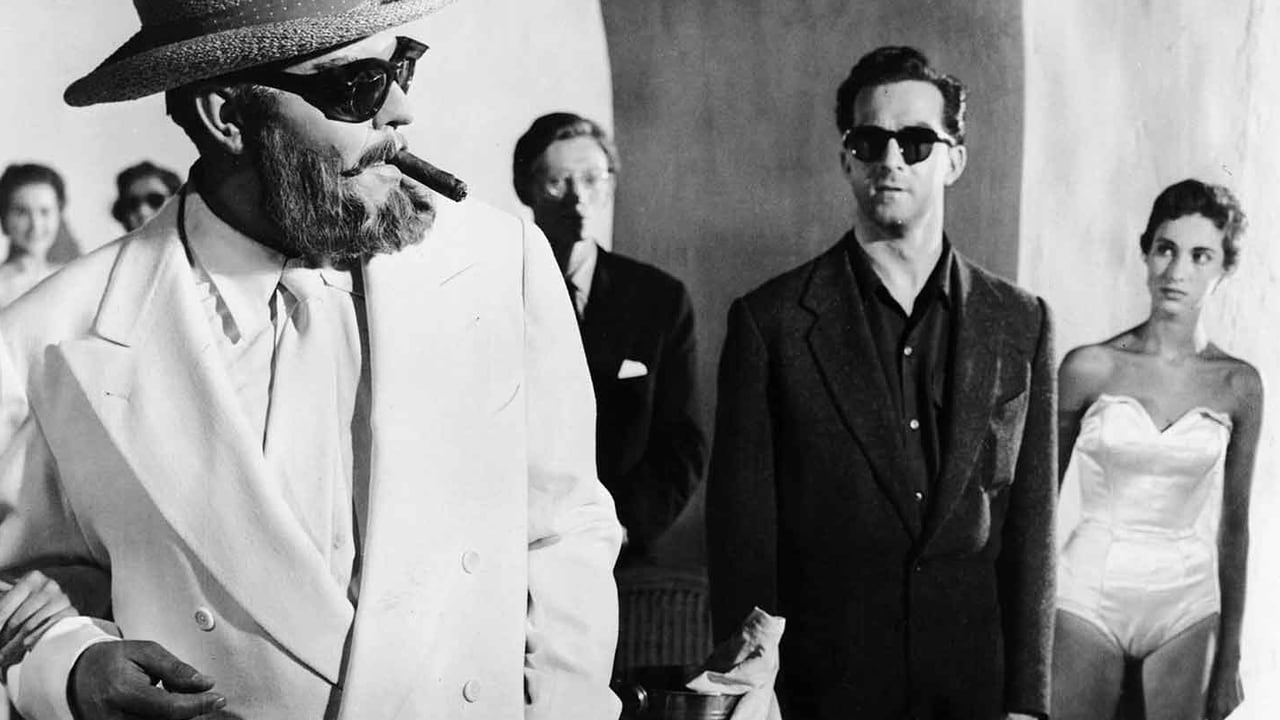RipDelight
This is a tender, generous movie that likes its characters and presents them as real people, full of flaws and strengths.
Brennan Camacho
Mostly, the movie is committed to the value of a good time.
Payno
I think this is a new genre that they're all sort of working their way through it and haven't got all the kinks worked out yet but it's a genre that works for me.
Bob
This is one of the best movies I’ve seen in a very long time. You have to go and see this on the big screen.
Tom Erik Høiås
I admire Orson Welles's ability to take a seemingly simple story and develop it into a brilliant one. with his square face covered in a huge beard and devious eye brows he makes the strongest character in this film. The leading character (Van Stratten) was all right, but he did not succeed creating a captivating performance. i saw this one at a friend of mine, he happened to have it on Criterion(at a steep price i might add). of course we saw the longest version as there are three versions to behold. the dialog coming out of Arkadin's(Welles) mouth is wonderful and just plain amusing. this film is a must see/own for those who enjoy the old stuff and those who appreciate the work of a cinematic genius .
JohnHowardReid
This fascinatingly bizarre recap of Citizen Kane pits the determined investigator (Robert Arden in his only starring role) against a subject (again flamboyantly played by Orson Welles) who is very much alive. In this round, Welles's screenplay ranges widely all over Europe, taking in such pictorially baroque splendors as a castle in Spain, a crate-laden Naples waterfront, ritzy fashion houses, wintry streets, desolate warehouses, a yacht tossing wildly in a raging sea. These are the self-imposed prisons not only of the supporting characters, but even of the broad-ranging Arkadin himself who is finally confined to the tiny cockpit of a small plane. To play the various cameos, Welles has assembled a first-rate cast—at least for the English-language version. I thought Suzanne Flon more effective than Spain's Amparo Rivelles, while Katina Paxinou way outshone Irene Lopez Heredia. (It must be admitted that Welles has directed these Spanish inserts rather slackly—if indeed he directed them at all. And they were certainly not photographed by Jean Bourgoin. Both are very brightly lit and neither have the noirish texture so brilliantly captured in the rest of the movie. And incidentally this is one reason I prefer the Corinth version to the others boxed in Criterion's splendid 3-disc set. The images are perfectly graded. And the dubbing is superior too. Welles decided to change some of the original dialog and was thus forced to re-dub many lines himself in the producer's re-edit called Confidential Report. That version has its moments, but over all, it was a grave mistake).
Mike P
Even the inherent beauty of an Orson Welles film and an interesting story can't overcome bad editing, terrible pacing, sub par acting and an awful dub. The problems start early on when you notice that, what do you know, the dialogue just doesn't really match the lip movements. They're always a bit ahead or a bit behind or just plain off. This is no mere technical gripe--the constant distraction ruined any chance of immersiveness that's so important to Welles' visual style, constantly reminding me that this is "just a movie." A further problem, which is kind of hard to explain in text, is that the lines are not read like dialogue for a movie. Instead, they're read just like a radio show--like there's nothing to pay attention to except whatever the characters are saying. This combined with the frenetic editing results in most of the film being an endless barrage of spoken narration and dialogue with nary a break between lines. It sounds like the actors are trying to get through the script as quickly as humanly possible, and thus the nice acting of many characters is lost because it all sounds so staged. Finally, the acting of two of the leads, Robert Arden and Paula Mori (including whoever dubbed her voice), is terrible. Their characters are supposed to provide a lot of the film's emotion, but they have no chemistry or charisma. Orson Welles himself does a nice job, but constantly seems to be overacting because he's matched against such wooden and cloying performances.The only reason one would watch this, except for being a Welles completist, is for some very beautiful camera-work, but even that is only on display in bursts here and there. And the story, while having a lot of potential, is told in such a haphazard way that it cannot be said to have been realized to any degree. The last quarter of the film in particular includes some actions by both Arkadin and Van Stratten that seem maddeningly incomprehensible, as well as a five-minute-long segment consisting almost entirely of a minor character repeatedly asking for goose liver.I would recommend watching The Lady From Shanghai instead of this for a film with similar themes that works despite even more pronounced attempts by the studio to butcher Welles' work.
blanche-2
One of my favorite people to read about and watch is Orson Welles. So I watched "Mr. Akadin," or "Confidential Report," as it is sometimes known, with great interest. By 1955, Welles was a Hollywood outsider, the great years behind him. He made films on a shoestring and hired himself out to get money to complete them. The most heartbreaking part of one of his biographies is the story of Welles having dinner with Spielberg, hoping the dynamic director could help him get a distributor for his latest movie. But Spielberg only wanted to talk about the past, about the legendary Orson Welles. No one would help him, not Warren Beatty, no one."Mr. Arkadin" is the story of a man, Guy Van Stratten, who runs around the world on the basis of a few words heard as a man is dying, words, the man assures him, that are worth millions. Just seek out Mr. Arkadin and mention Bracco and Sophie. Van Stratten, a hood, and a woman, Mily, do just that, and Van Stratten meets and later falls in love with Arkadin's daughter (played by Welles' third wife, Paola Mori) and gets inside the man's home and life. Arkadin claims amnesia and hires Van Stratten to find out about his past for him.This is a good story in a problematic film. There are the Welles touches of the odd camera angles and special lighting, but the film is disconcerting because the dubbing is way off - I at first thought it had been made in another language. Also, some of the acting is just horrible, particularly from Patricia Medina (Mily) and Robert Arden (Van Stratten). However, Welles assembled a brilliant group of foreign character actors for the other roles - Akim Tamirof, Gert Frobe, Michael Redgrave, Mischa Auer, Katina Paxinou - incredible, and they probably did their roles as favors for Welles for very little. Welles himself plays Arkadin, and it's a broad performance we're used to seeing when, frankly, he's phoning it in, which he did here as he was busy with everything else involved in the movie."Mr. Arkadin" looks like a student film, but it has some wonderful moments, both frightening and funny. A Welles film is always worth seeing even if it doesn't always exactly hit the mark. And he hit the mark so many times - you never know when something he did is going to turn into a masterpiece.

